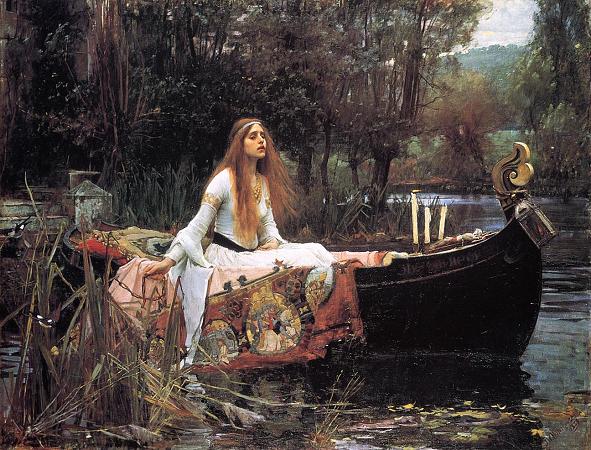Alfred Tennyson (1809 - 1892). Alfred Tennyson, 1st Baron Tennyson was a British poet. He was the Poet Laureate of Great Britain and Ireland during much of Queen Victoria's reign and remains one of the most popular British poets. In 1829, Tennyson was awarded the Chancellor's Gold Medal at Cambridge for one of his first pieces, Timbuktu. He published his first solo collection of poems, Poems Chiefly Lyrical in 1830. Claribel and Mariana, which remain some of Tennyson's most celebrated poems, were included in this volume. Although decried by some critics as overly sentimental, his verse soon proved popular and brought Tennyson to the attention of well-known writers of the day, including Samuel Taylor Coleridge. Tennyson's early poetry, with its medievalism and powerful visual imagery, was a major influence on the Pre-Raphaelite Brotherhood. Tennyson also excelled at penning short lyrics, such as Break, Break, Break, The Charge of the Light Brigade, Tears, Idle Tears, and Crossing the Bar. Much of his verse was based on classical mythological themes, such as Ulysses, although In Memoriam A.H.H. was written to commemorate his friend Arthur Hallam, a fellow poet and student at Trinity College, Cambridge, after he died of a stroke at the age of 22. Tennyson also wrote some notable blank verse including Idylls of the King, Ulysses, and Tithonus. During his career, Tennyson attempted drama, but his plays enjoyed little success. A number of phrases from Tennyson's work have become commonplaces of the English language, including Nature, red in tooth and claw, 'Tis better to have loved and lost / Than never to have loved at all, Theirs not to reason why, / Theirs but to do and die, My strength is as the strength of ten, / Because my heart is pure, To strive, to seek, to find, and not to yield, Knowledge comes, but Wisdom lingers, and The old order changeth, yielding place to new. He is the ninth most frequently quoted writer in The Oxford Dictionary of Quotations. Tennyson was born on 6 August 1809 in Somersby, Lincolnshire, England. He was born into a middle-class family distantly descended from John Savage, 2nd Earl Rivers. His father, George Clayton Tennyson, was rector of Somersby, also rector of Benniworth and Bag Enderby, and vicar of Grimsby. Rev. George Clayton Tennyson raised a large family and was a man of superior abilities and varied attainments, who tried his hand with fair success in architecture, painting, music, and poetry. He was comfortably well off for a country clergyman and his shrewd money management enabled the family to spend summers at Mablethorpe and Skegness on the eastern coast of England. Alfred Tennyson's mother, Elizabeth Fytche, was the daughter of Stephen Fytche, vicar of St. James Church, Louth and rector of Withcall, a small village between Horncastle and Louth. Tennyson's father carefully attended to the education and training of his children. Tennyson and two of his elder brothers were writing poetry in their teens and a collection of poems by all three was published locally when Alfred was only 17. One of those brothers, Charles Tennyson Turner, later married Louisa Sellwood, the younger sister of Alfred's future wife; the other was Frederick Tennyson. Another of Tennyson's brothers, Edward Tennyson, was institutionalised at a private asylum. Tennyson was a student of King Edward VI Grammar School, Louth from 1816 to 1820. He entered Trinity College, Cambridge, in 1827, where he joined a secret society called the Cambridge Apostles. A portrait of Tennyson by George Frederic Watts is in Trinity's collection. At Cambridge, Tennyson met Arthur Hallam and William Henry Brookfield, who became his closest friends. His first publication was a collection of his boyish rhymes and those of his elder brother Charles entitled Poems by Two Brothers, published in 1827. In 1829, Tennyson was awarded the Chancellor's Gold Medal at Cambridge for one of his first pieces, Timbuktu. Reportedly, it was thought to be no slight honour for a young man of twenty to win the chancellor's gold medal. He published his first solo collection of poems, Poems Chiefly Lyrical in 1830. Claribel and Mariana, which later took their place among Tennyson's most celebrated poems, were included in this volume. Although decried by some critics as overly sentimental, his verse soon proved popular and brought Tennyson to the attention of well-known writers of the day, including Samuel Taylor Coleridge. In the spring of 1831, Tennyson's father died, requiring him to leave Cambridge before taking his degree. He returned to the rectory, where he was permitted to live for another six years and shared responsibility for his widowed mother and the family.
more...





